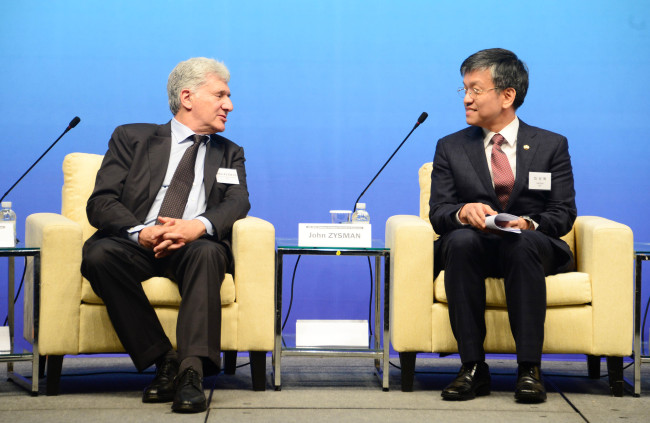S. Korea urged to prepare for fourth industrial revolution
By Korea HeraldPublished : Oct. 28, 2016 - 16:12
The manufacturing-reliant Korean economy should brace for wider disparities in jobs and wages amid the nearing digital revolution, experts said Friday.
Insights and policy suggestions came at an international conference on the fourth industrial revolution in Seoul, organized by the Institute for Global Economics.
Industry experts discussed how a paradigm shift in the industrial sector is boosted by cloud computing and big data analysis in production, management and governance.
Carl Benedikt Frey, co-director of Oxford Martin Programme on Technology and Employment, said that the US economy will lose about 47 percent of manufacturing jobs due to the impact of automation in new industries.
Jobs requiring creativity will continue to grow in new industries but low-skilled work that can be substituted by robots will diminish, he said.
While revenue made by automakers in Detroit during the 1930s is on par to the revenue currently being made in Silicon Valley, the number of jobs has been greatly reduced in the technology hub, he said.
Insights and policy suggestions came at an international conference on the fourth industrial revolution in Seoul, organized by the Institute for Global Economics.
Industry experts discussed how a paradigm shift in the industrial sector is boosted by cloud computing and big data analysis in production, management and governance.
Carl Benedikt Frey, co-director of Oxford Martin Programme on Technology and Employment, said that the US economy will lose about 47 percent of manufacturing jobs due to the impact of automation in new industries.
Jobs requiring creativity will continue to grow in new industries but low-skilled work that can be substituted by robots will diminish, he said.
While revenue made by automakers in Detroit during the 1930s is on par to the revenue currently being made in Silicon Valley, the number of jobs has been greatly reduced in the technology hub, he said.

Song Jong-guk, president of the state-run think tank Science & Technology Policy Institute, noted that the manufacturing-based Korean economy will have plenty of opportunities in the digital revolution era, but will face a widening gap in the quality of jobs and income.
“I have bigger worries about the gap in job quality than in the reducing number of jobs. On the policy side, the government should deal with this big challenge as well as the ensuing income gap in the long run,” Song said.
Justin Wood, head of Asia Pacific at the World Economic Forum, warned that Korea’s “protective corporate landscape” will not help the market embrace new changes, although Korea has positive factors such as good ICT infrastructure and high expenditure on R&D.
“The government here is keen to make sure SMEs thrive but their over generous financial support distorts the market. The government needs to let more companies fail,” Wood said.
He also urged Korean companies to quickly respond to changes outside. “It’s not about big fish eating small fish. It’s about fast fish eating slow ones,” he said.
Jonathan Woetzel, director of McKinsey Global Institute, noted that while Korea is currently feeling the effects of the decline in the working age population, its spending on vocational education is “very little” at 2.5 percent of GDP.
Finance Minister Yoo-il-ho said the government will spend 1.6 trillion won in the next 10 years to nurture nine core technologies, such as AI and virtual reality in his congratulatory remarks.
“The government will give tax incentives to encourage promising industries,” Yoo said in the speech read by Vice Finance Minister Choi Sang-mok.
The government will also ease regulations and reform the labor sector to make it more flexible, he said.
By Kim Yoon-mi (yoonmi@heraldcorp.com)
-
Articles by Korea Herald





![[From the Scene] Monks, Buddhists hail return of remains of Buddhas](http://res.heraldm.com/phpwas/restmb_idxmake.php?idx=644&simg=/content/image/2024/04/19/20240419050617_0.jpg&u=20240419175937)









![[From the Scene] Monks, Buddhists hail return of remains of Buddhas](http://res.heraldm.com/phpwas/restmb_idxmake.php?idx=652&simg=/content/image/2024/04/19/20240419050617_0.jpg&u=20240419175937)

![[KH Explains] Hyundai's full hybrid edge to pay off amid slow transition to pure EVs](http://res.heraldm.com/phpwas/restmb_idxmake.php?idx=652&simg=/content/image/2024/04/18/20240418050645_0.jpg&u=20240419100350)

![[Today’s K-pop] Illit drops debut single remix](http://res.heraldm.com/phpwas/restmb_idxmake.php?idx=642&simg=/content/image/2024/04/19/20240419050612_0.jpg&u=)